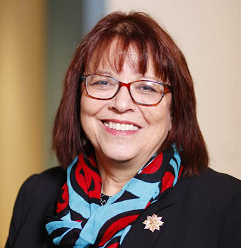Guest Opinion. The experiences of Native people with boarding schools touches nearly every Native American alive today.

The federal government policy had a goal of total assimilation of Native people. This assimilation was to be achieved by separating children from families, banning the use of Native languages, and forcing children and young people to adopt Western practices, including insisting they give up their own spiritual ways to become Christians. During this period across several generations, many children were physically abused, sexually assaulted, malnourished, and mistreated. The Interior Department urged the U.S. government this summer to formally apologize for the enduring trauma inflicted on Native Americans. The trauma of those experiences reverberates across Indian Country today.
Yet this dark period in American history is largely unknown to non-Natives. I hope President Biden’s apology not only raises awareness of the true Native history in our country but is a step towards national reconciliation and healing.
We join Tribes, Native organizations, and our Native relatives and allies in the call for reparative actions. Today we call for a significant investment by the federal government and philanthropy in restorative and healing approaches and institutions to repair the harm done by the boarding school era. The Native people who we support, from our youngest children to our college students, deserve that investment. The tribal college and university movement that emerged over 50 years ago to support place-based, Native-led, and tribally controlled education deserves that investment.
We also thank Interior Secretary Deb Haaland, a member of the Pueblo of Laguna tribe of New Mexico, whose grandparents and great-grandfather were taken from their homes and sent to boarding schools. Under her leadership, the boarding school investigation launched three years ago, and was the first time the U.S. government scrutinized the schools and listened to the stories of boarding school survivors and their descendants. Secretary Haaland’s leadership was vital to the formal apology American Indian and Alaska Native people received today."
Cheryl Crazy Bull, Wacinyanpi Win (They Depend on Her), the President and CEO of the American Indian College Fund, is a citizen of the Sicangu Lakota Nation. She has been in her position with the American Indian College Fund since 2012.
More Stories Like This
Tribes Seek Better Data, Real Accountability in MMIP Cases Ahead of Tribal ConsultationWhat Would Dr. King Say About ICE?
In Unity and Commitment
Protecting Our People through Human Trafficking Awareness
It is Time for Animal Behavior to Become Its Own Discipline
Help us defend tribal sovereignty.
At Native News Online, our mission is rooted in telling the stories that strengthen sovereignty and uplift Indigenous voices — not just at year’s end, but every single day.
Because of your generosity last year, we were able to keep our reporters on the ground in tribal communities, at national gatherings and in the halls of Congress — covering the issues that matter most to Indian Country: sovereignty, culture, education, health and economic opportunity.
That support sustained us through a tough year in 2025. Now, as we look to the year ahead, we need your help right now to ensure warrior journalism remains strong — reporting that defends tribal sovereignty, amplifies Native truth, and holds power accountable.
 The stakes couldn't be higher. Your support keeps Native voices heard, Native stories told and Native sovereignty defended.
The stakes couldn't be higher. Your support keeps Native voices heard, Native stories told and Native sovereignty defended.
Stand with Warrior Journalism today.
Levi Rickert (Potawatomi), Editor & Publisher

